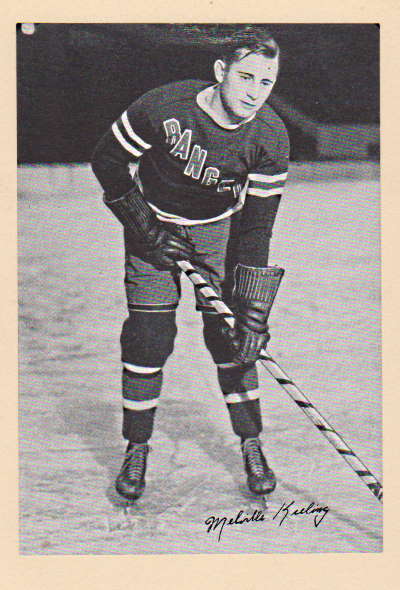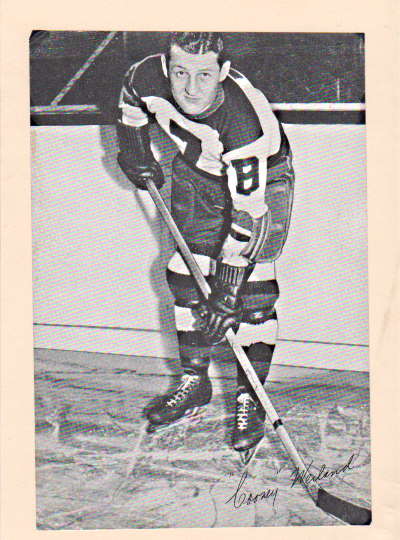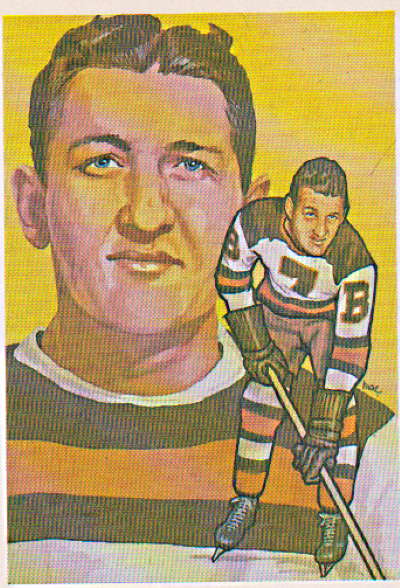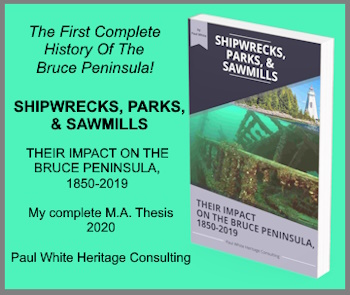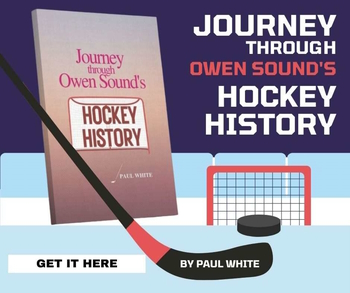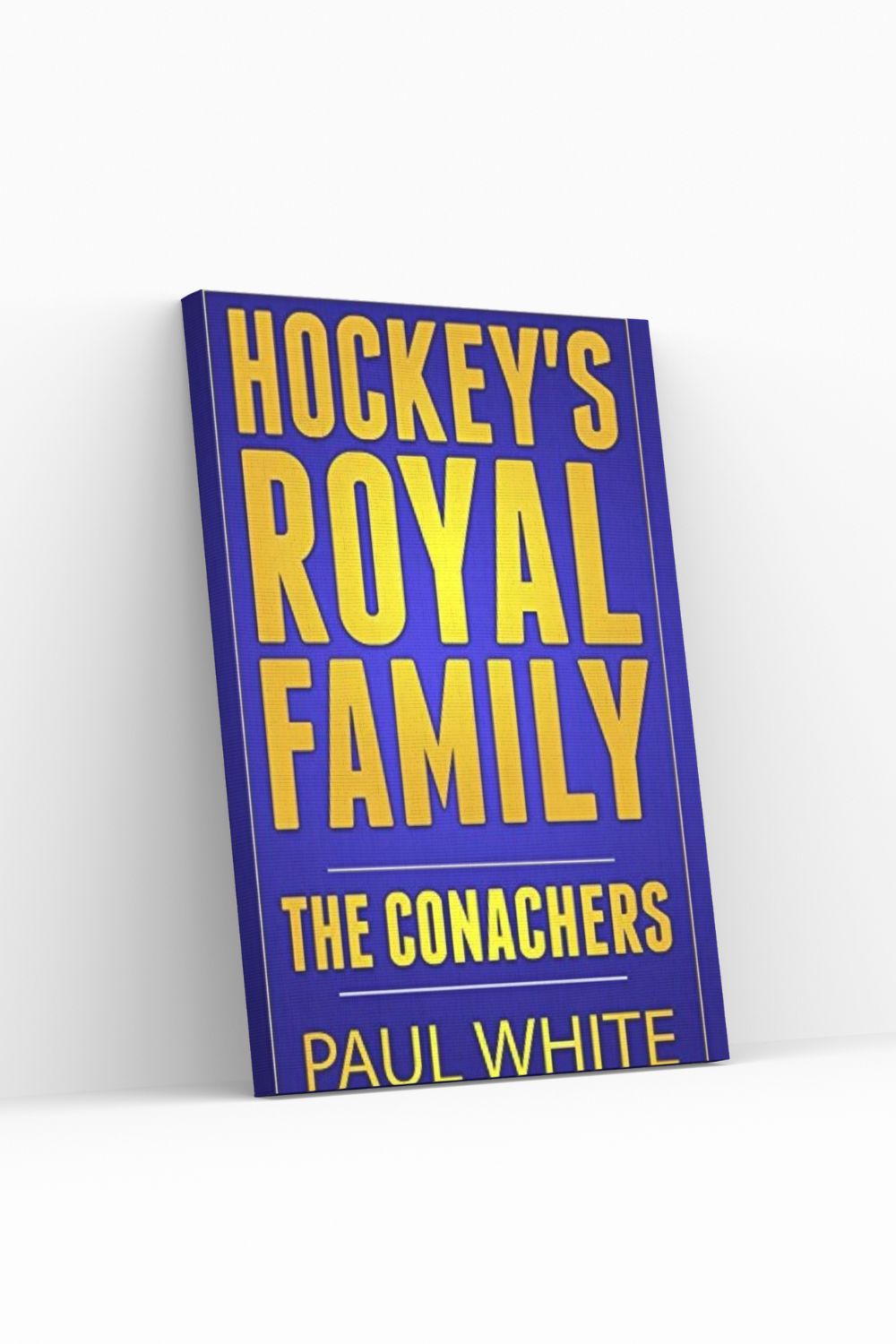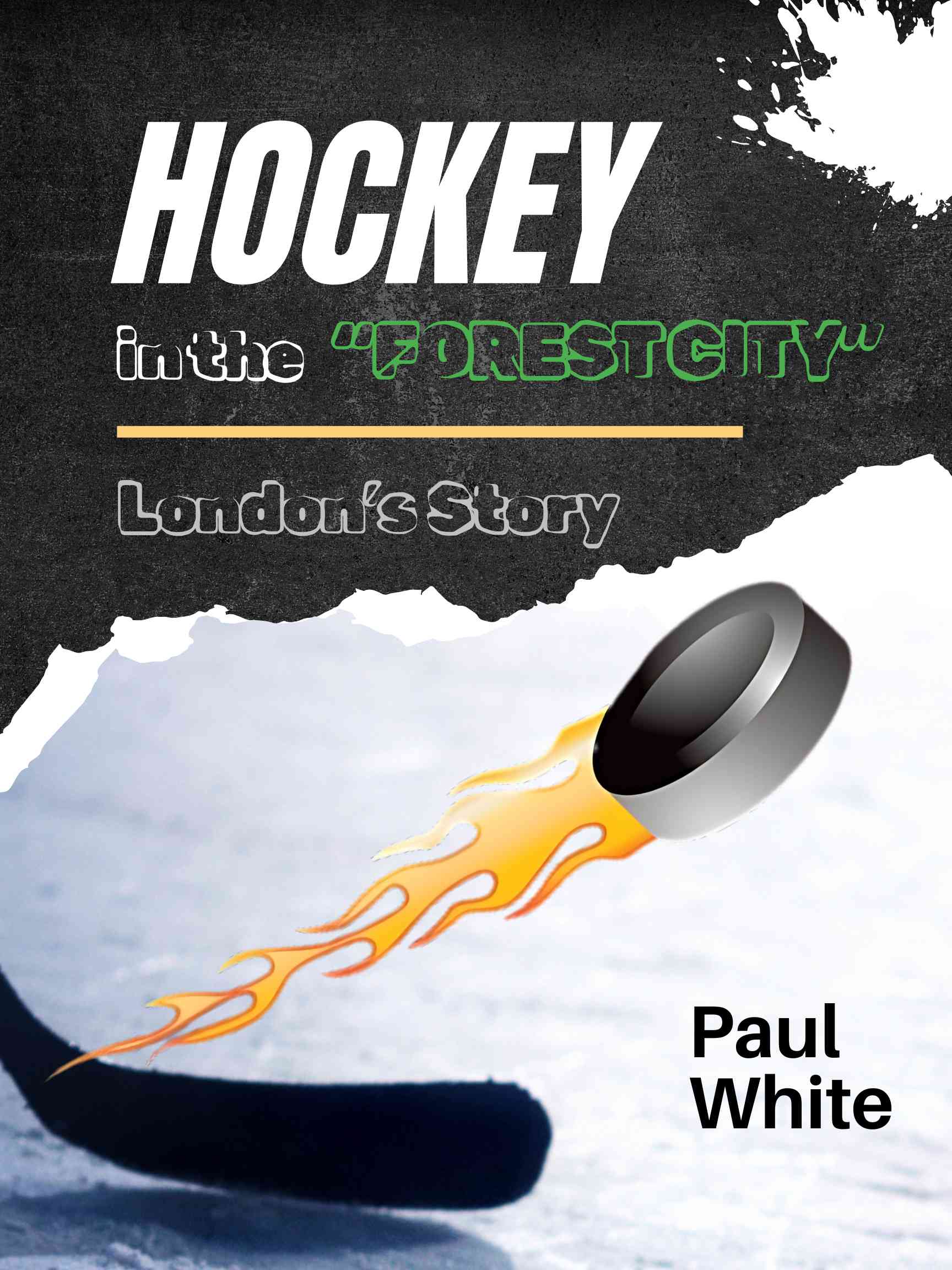Ralph "Cooney" Weiland
Ralph "Cooney" Weiland skated from a Memorial Cup championship in Owen Sound, to a Stanley Cup in Boston and later, to fame as a U.S. college hockey coach.
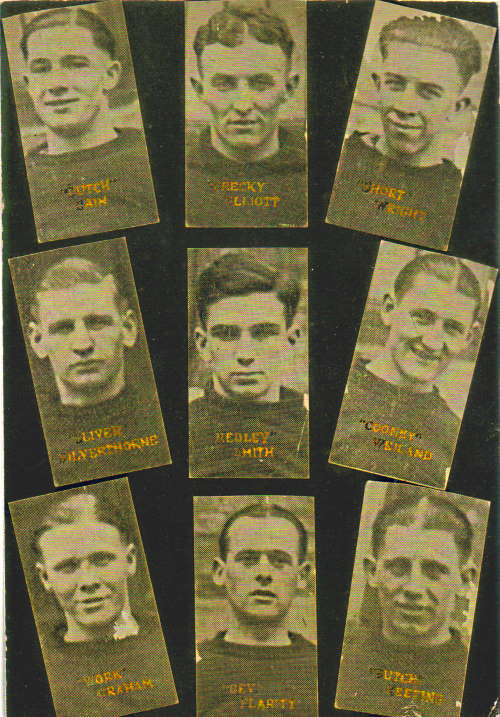 1924 Owen Sound Greys Memorial Cup Champions
1924 Owen Sound Greys Memorial Cup ChampionsDutch Cain, George Elliott, Wright,
Silverthorne, Smith, Cooney Weiland,
Teddy Graham, Flarity,Butch Keeling
“Cooney” Weiland was born on November 5, 1904 in Egmondville (near Seaforth), Ontario. He played minor hockey in the Seaforth area until he was 19 years old when he made his way to Owen Sound to play junior hockey with the Owen Sound Greys.
A 1979 article in the Huron Expositor described Ralph “Cooney” Weiland as “a born athlete, agile as a cat and skilled in all sports: running, swimming, soccer, baseball and especially skating and hockey... Sports were his life”.
A friend described his memories of “Cooney” during their childhood in Egmondville, saying that Weiland dreamed of a professional hockey career. His friend recalled,
"As a boy I remember him skating and playing hockey, sometimes by himself, on a sheet of ice below the old Egmondville bridge. At other times, he would have a group of village boys playing hockey after school hours, during weekends or Christmas holidays on the ice below the bridge....”Cooney” was the star player."
"He could skate rings around everyone else. At that young age he concentrated on skating, stickhandling and scoring. Our puck was at first a rubber heel from an old shoe, later a real rubber puck, although used, which we managed to buy or trade for."
In the summer months “Cooney” Weiland would practice playing hockey with some of his friends in the sprouting room of the old Colbert Brewery located on the banks of the Bayfield River. This large room had a tin floor and walls lined with tin. The noise was deafening. However, this was “Cooney’s” method of constant practice and improving his hockey skills. More than once he said that someday he would become a famous hockey player. He had hitched his wagon to a star. Weiland entered high school in 1918 and he became not only an outstanding athlete but also a good student. When he wasn’t studying, “Cooney” was active in high school sports. He set records in the high jump, the standing high jump, and pole vaulting. In baseball he was considered one of the best shortstops in the collegiate league. Despite his successes in so many areas, a career in hockey was his dream. In the fall of 1922, he left school and headed to Owen Sound to tryout for the junior hockey team, the Greys.
The 1923-24 hockey season may have been the turning point in Weiland’s career and the catalyst necessary for the fulfillment of his dreams of a hockey career. The Greys that season were an awesome force in junior hockey circles. They averaged 8.9 goals a game, en route to a 22-2-2 season. At the forefront of this scoring machine was the line of "Cooney" Weiland, future New York Ranger “Butch” Keeling, and George Elliott who accounted for an amazing 170 of the team’s 204 goals that season. Weiland centred the line and while he led the team with 68 goals, an astounding one-third of his team’s total goals, his playmaking ability without a doubt enhanced the scoring totals of his linemates.
Owen Sound's First Memorial Cup
“Cooney” and his mates capped this tremendous season by winning Owen Sound’s first Memorial Cup championship. Perhaps the attention gained from winning Canada’s junior hockey title helped "Cooney" Weiland and Keeling come to the attention of the professional hockey teams.
After graduating from junior ranks, Joe Sills, a professional hockey player from Seaforth urged “Cooney” to try out for the Minneapolis Rockets. He played with the Rockets in the 1924-25 season. The next year he joined the Minneapolis Millers in the minor professional ranks. On December 23, 1927, "Cooney" Weiland was sold to the Boston Bruins. However, he continued to play for the Millers until the end of the 1927-28 hockey season.
"Cooney" is Dynamite in Boston
“Cooney” joined the Boston Bruins for the 1928-29 NHL season. In his inaugural campaign his team captured the Stanley Cup, a feat that he would repeat in his last season as a player. In The Trail of the Stanley Cup, Charles Coleman, described the impact that Weiland made upon his arrival in Boston.
Art Ross picked up two great prizes when he signed Cecil Thompson and Ralph Weiland of the Minneapolis Millers...He dropped the little centre Weiland between two big six-footers, Dit Clapper and Dutch Gainor, and the “Dynamite Line” was formed which was a big factor in Boston winning the championship and the Stanley Cup for the first time.
Weiland was almost an immediate success in the NHL. In the 1929-30 season, Weiland won the league scoring title, setting a league record with 43 goals and 30 assists in 44 games. His point total was the most points amassed in the NHL (the previous season record of 51 had been held by Howie Morenz). That record stood for thirteen years until Doug Bentley surpassed him. Coleman described “Cooney’s” scoring abilities as follows:
“'Cooney' was a slick stickhandler and could manipulate the puck through the sticks and legs of his opponents’ like a magician, to the delight of fans who marveled at his skill. At 5'10" and 150 pounds through most of his 11-year playing career, “Cooney” was a pipsqueak by today’s standards and by informed accounts also a bit of a “cherry picker”..."
After four years with the Bruins, he was traded to the Ottawa Senators for Joe Lamb and $7,000. On November 26, 1933, Cooney was dealt to the Detroit Red Wings for Carl Voss and cash. Two years later, he was traded back to the Bruins along with Walt Buswell for Marty Barry and Art Giroux.
Weiland concluded his playing career in Boston in 1939, when once again he led the Bruins to a Stanley Cup victory. Cooney played in an era of hockey when scoring numbers were low, yet he tallied 173 goals and 160 assists in 509 regular season games. He was named to the NHL 2nd All-Star team in 1934-35, won the scoring title in 1929-30 and played on two Stanley Cup Champions and coached another Stanley Cup winner.
In 1940 he became the coach of the Bruins and under his tutelage Boston captured the Stanley Cup in 1941. Weiland was named coach of the year in the NHL, but despite this success, he had some disagreements with Art Ross and was dismissed from his coaching duties with the Bruins. He then coached AHL teams in Hershey and New Haven.
"Cooney" Weiland Goes to College
In 1950 Ralph “Cooney” Weiland began a new career which would bring him almost as much recognition as his glorious days in the NHL. That year he was hired as the hockey coach at perhaps the most prestigious academic institution in North America, Harvard University! He held this position until his retirement in 1971, the same year that he was inducted into the Hockey Hall of Fame.
When he retired from Harvard he was one of only four U.S. college coaches to win 300 games. He left coaching ranks a winner. Although Harvard had not been the top-ranked college hockey team that season, he led his troops to the ECAC title. His 21 years of effort to improve collegiate hockey in the United States did not go unnoticed. In 1972 Ralph “Cooney” Weiland was honoured with the Lester Patrick Trophy which is awarded for outstanding service to the sport of hockey in the United States.
Ralph “Cooney” Weiland died on July 3, 1985 in Boston.
A version of this story originally appeared in my Local History column in the Owen Sound Sun Times.
More Great Information Pages
About Owen Sound Hockey History
The 1920s Owen Sound Hockey Stars made there mark in amateur ranks and then many of them went on to careers in the NHL and other professional hockey leagues.
The 1927 Owen Sound Greys with a priest serving as coach named Jack Spratt and not one experienced defenseman were an unlikely Canadian National Hockey Championship team.
Benny Grant: Memorial Cup Champ grew up in Owen Sound and enjoyed a hockey career, which included a surprising turn of events that led to a stint in the NHL.
"Buck" Jones, like most Canadian boys, dreamed of playing in the NHL. Little did he realize that one day he would wear the sweater of an NHL club and would be the idol of youngsters like himself!
The Chin Brothers dominated in their hockey league which drew attention from the Detroit Red Wings and the Toronto Maple Leafs.
Ralph "Cooney" Weiland skated from a Memorial Cup championship in Owen Sound, to a Stanley Cup in Boston to fame as a U.S. college hockey coach.
The Crescent Club has a long history of sponsoring sports teams and leagues in Owen Sound providing consistent management and financial assistance to athletics.
"Cyclone" Taylor was hockey's first superstar. Born in Tara Ontario, he was involved in a controversy in Ottawa which still has not been resolved.
Doug Brindley: From Maple Draft Choice to a role in Slap Shot: a Memorial Cup champ; coached by Don Cherry; and he played in the WHA; what more could a Walkerton Ontario native ask for in a hockey career?
The Durham Yellowjackets hockey team was a force to be reckoned with in Ontario Intermediate hockey in the 1930s.
Goalie "Red" Henry: An All-Star Netminder: Another great Owen Sound goalie who played for the love of the game.
"Hap" Day was a Hall of Fame hockey player, coach and general manager as well as a life-long Toronto Maple Leaf.
Norm Locking Chicago Black Hawks & Former Owen Sound Grey was known for his hard and deadly shot in Al Capone's Chicago.
Harry Lumley spent his Hall of Fame hockey career tending the nets for four NHL clubs and he spent one period of a hockey game goaltending for a fifth NHL team.
Henry Kelso: Owen Sound Sports Legend not only contributed to the sporting life of his students, he also had a significant influence on the rest of their lives.
Junior Hockey Commentary: Should there be controversy about the use of non-local hockey players? This article was written in 1998 in response to a letter to the editor in the Owen Sound Sun Times.
Meaford Knights Hockey: The 1953-54 Championship Knights' line-up had of several pairs of brothers. Many felt that the brothers made a winning difference.
Newspaper Sports: Owen Sound Hockey History was detailed in the pages of the Owen Sound Sun Times in detail in the days before the radio and television eras.
Owen Sound Hockey's early history some references suggest started in the 1880s. However there are records of organized hockey teams beginning in the early 1900s.
Owen Sound was a Hockey Hotbed in 1950-51: Their fans were hockey crazy during this OHA Senior A Championship season as their star-studded team marched to an Allan Cup victory.
The 1959-60 Owen Sound Greys: A Tough Act to Follow: Tragedy struck this hockey team of young men, yet they persevered.
The 1960s Owen Sound Greys Stars who went on to NHL action including Brian Perry, Doug Brindley, Jim Schoenfeld, and Jack Lynch brought Owen Sound a reputation as a hockey hotbed!
Owen Sound Attack: The arrival of this new OHL team is the latest chapter in the Owen Sound region's rich hockey history.
Owen Sound Goalies: Why does Owen Sound produce so many fine goaltenders? There must be something in the water!
Some Great Owen Sound Greys. The history of this hockey team is a story of players who were not only local boys, but came from many locations to hone their skills.
Owen Sound Hockey Heritage stretches from rural farmhouses on Saturday night to backyard rinks to cheering for local hockey successes and hockey heroes.
Owen Sound Junior Hockey History began almost one hundred and twenty years ago and is rich with championship teams, great players, and dedicated fans.
Owen Sound's New Arena in 1938 opened a new era in Grey and Bruce counties with the first artificial ice making machine in western Ontario north of Kitchener.
Owen Sound Platers: Ray McKelvie the quiet and knowledgeable leader behind the success of the 1999 hockey team.
Pat McReavy enjoyed a long hockey career which brought him three championships, the Stanley Cup, the Allan Cup and a World Hockey Title.
Paul MacDermid, born in Chesley Ontario, through hard work and determination enjoyed a 12 year NHL career, before keeping junior hockey alive in Owen Sound by working with a group citizens to purchase the Attack OHL franchise.
"Red" Armstrong, a fiery spirited hockey player, known more for his fierce checking than his scoring prowess surprised even himself on his first NHL shift.
Red Leckie was more than a good hockey player. He played for the team, not for himself. Outside hockey, he responded when he saw a need in his community.
Southampton hockey history in the early years featured a distinct line of defense in the local arena, and stories of interesting "road" trips.
Tommy Burlington: the Greatest North American Never to Play in the NHL captured scoring titles in every league that he played, bringing comparisons to NHL greats.
Owen Sound Hockey History is rich with stories of championship teams, star hockey players, and community support.
